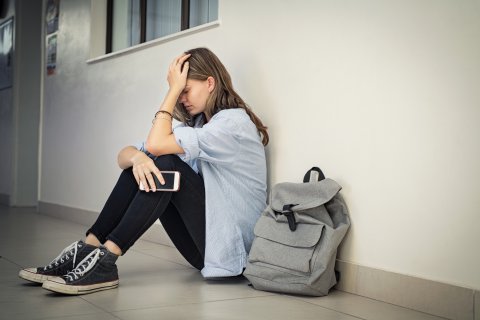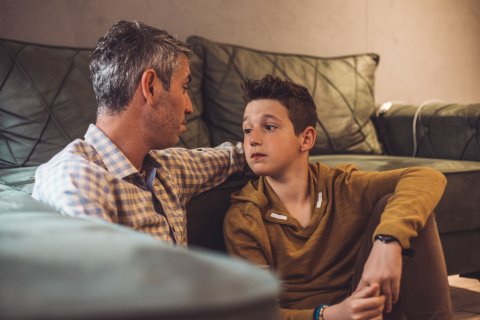Why is it okay for your body to be sick, but not your soul?

A depressed teenage daughter and two parents who have no idea how to deal with it. This all takes place in the theatre show “What the f*ck is happiness?” UU youth researchers Heidi Lesscher, Sanne Nijhof and Odilia Laceulle, chairs of the Dynamics of Youth community ‘Thriving & Healthy Youth’, organised this performance especially for students. Heidi Lesscher is pleased with the result: “The performance hit home and painted a complete picture of what depression is and what it means for young people and their environment. Art has such an amazing power to bring difficult subjects up for discussion!”
The performance starts with a search for the cause. Because the daughter always used to be such a sweet girl, a happy child. So what went wrong? Whose fault is it that the daughter became depressed? The mother? The father? The girl doesn't want to bother her parents with her depression. After all, they did their best to give her a good life. “For me, lying is just pretending to fit in with the ideal image,” says the teenage daughter, poignantly. Her parents don’t know what to do about the situation, and at some point, they decide to talk to her for half an hour every day. “It’s sweet they’re doing that for me, but I'm so tired that it doesn't help me much,” says the daughter.
For me, lying is just pretending to fit in with the ideal image.

A therapist is called in. But, as the daughter also realises: “Therapy is pointless if you don't participate.” One day, one of her peers rather astutely asks: “Aren't you just depressed?” It gives the daughter support, and for the first time she doesn’t feel alone. “Now I know what I am. Thirteen years old and depressed.” The daughter then manages to pluck up the courage to go to her parents anyway. “I'm scared and I need help.” But she doesn't feel taken seriously. Her father embraces his daughter's fear and says it's a talent. “Why don't you listen to me when I say something is wrong?”
After a big round of applause, actor Pieter Tiddens launches into the debriefing. Only now does the play turn out to be an autobiographical story by the father, Pieter himself. He didn't really know how to deal with his daughter's mental health issues. He wrote this play together with his now adult daughter and other young people with mental health problems, and with help from Yvonne Stikkelbroek, scientist practioner at Utrecht University and in mental health care.
What does our UU research say about young people's mental health?
In the Health Behaviour in School-aged Children study (HBSC) researchers from Utrecht University, the Trimbos Institute and het Sociaal Cultureel Planbureau examine the health, well-being, behaviour and social environment of young people aged 11 to 16 in the Netherlands. Every four years, the HBSC collects data to discover relatively long-term trends. The latest report was published in September 2022. There appears to be a significant increase in emotional problems, especially among girls. Although boys are also experiencing more mental health problems, there is a huge increase among girls. A big increase in perceived performance pressure was also observed by schools, once again particularly in girls.
Everyone just says talk about it, talk about it. But that’s easier said than done.
Students were enthusiastic about the show: “I thought it tackled lots of different aspects. It's great to identify with something like this, when you thought you were the only one experiencing it,” says veterinary student Danique. Her fellow student Julia adds: “I have a friend who is having a very hard time herself. Just like in the show, she would also rather not share her mental health problems with her parents. Because she was afraid they would be disappointed, or worried. Everyone just says talk about it, talk about it. But that’s easier said than done.”
Another aspect that students mentioned was the distinction made between mental and physical illness. “Why is it okay for your body to be sick, but not your soul?” asks the daughter in the play. “Nonsense,” agrees Saskia, a Liberal Arts and Sciences student: “Staying at home for a day because you're not feeling good mentally is just as helpful. I think our society is much too focused on persevering and working hard and really going for it. Progress is supposed to come at the expense of everything else. I think that mindset is one of the reasons why people are having such a hard time now.”
The Dynamics of Youth community Thriving & Healthy Youth at Utrecht University organised this performance because of the sharp increase in mental health issues among students. Heidi Lesscher explains why: “By means of this performance, we wanted to encourage students to discuss mental health issues with each other. For example, what should you do if you are concerned about your own health or that of a roommate? We gave the students business cards with information telling them where they can go for more information, both inside and outside our university.”

What can parents do if their children are having mental health issues? The students conclude with their own tips. Saskia starts: “I think it’s very important for parents to take their children and their pain seriously. Asking for attention is sometimes seen as something negative. But what else should a child do? There is a reason why someone is asking for attention.” Danique adds: “And don’t try to make the problem smaller than it is.” Julia concludes: “Try to listen to your son or daughter and accept that your child feels that way. Don't come up with advice or solutions straight away. That’s not listening. Listening is just listening.”
Don't come up with advice or solutions straight away. That’s not listening. Listening is just listening.

